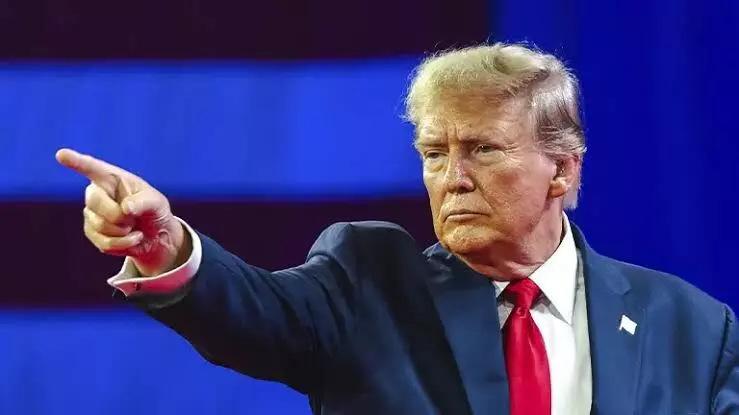Team Musk flags, Trump waves, but a fact-check: $21 million did not go to India for ‘voter turnout’, was for Bangladesh

A USAID funding controversy has sparked political debate after the Trump administration’s Department of Government Efficiency (DOGE) flagged a $21 million grant, initially reported to be for voter turnout in India. The ruling BJP accused the Congress of leveraging foreign assistance to influence elections. However, official records accessed by The Indian Express reveal that the grant was designated for Bangladesh, not India.
During a speech in Miami, former US President Donald Trump questioned the necessity of the funding, saying, “Why do we need to spend $21 million for voter turnout in India? Wow, $21 million! I guess they were trying to get somebody else elected.” However, documents show that this funding was allocated in 2022 for political and civic engagement projects in Bangladesh, particularly among students, ahead of the country’s January 2024 elections.
USAID Grant Linked to Bangladesh
The $21 million grant in question was part of a broader $486 million USAID program channeled through the Consortium for Elections and Political Process Strengthening (CEPPS), a Washington, DC-based organization specializing in democracy and governance initiatives.
Contrary to claims of Indian involvement, data from the US federal spending database confirms that no USAID-funded CEPPS project has been active in India since 2008. The only ongoing grant with the $21 million figure was allocated under the Federal Award Identification Number 72038822LA00001 in July 2022 for a project in Bangladesh, initially titled Amar Vote Amar (My Vote is Mine), later renamed Nagorik (Citizen) Program.
A December 2024 LinkedIn post by USAID’s political processes advisor in Dhaka, Lubain Masum, acknowledged the funding, confirming that USAID’s $21 million CEPPS/Nagorik project was actively managed under his oversight.
Allocation and Impact in Bangladesh
Between July 2022 and October 2024, the $21 million grant was divided into six sub-grants, distributed among CEPPS member organizations: the International Foundation for Electoral Systems (IFES), the International Republican Institute (IRI), and the National Democratic Institute (NDI).
Campaign materials and social media posts provide insight into how the funds were utilized in Bangladesh. A post by Dhaka University’s Micro Governance Research (MGR) program director, Aynul Islam, noted that between 2022 and 2024, 544 youth-focused events were conducted to promote democratic engagement, reaching over 10,000 students through 221 action projects and 170 democracy sessions. Islam, a senior consultant with IFES, also played a key role in launching the Applied Democracy Lab (ADL) at Dhaka University, backed by USAID and IFES.
USAID Bangladesh publicly acknowledged its involvement, stating on January 8, 2025, that it had partnered with Dhaka University to establish ADL. Speaking to The Indian Express, Islam confirmed USAID’s role in funding the Nagorik program via CEPPS. Regarding DOGE’s decision to halt funding, he expressed concern but remained optimistic that the initiative would continue within the university framework.
Reports Highlight Electoral Concerns
Further reports by NDI and IRI, which were part of the USAID-funded project, detail the role of the *Nagorik* program. The two organizations conducted pre-election and technical assessment missions in Bangladesh to evaluate electoral conditions before, during, and after the January 7, 2024, parliamentary elections. Their final report, published in March 2024, raised concerns over alleged biased enforcement of election rules favoring the ruling Awami League and a perceived politicization of law enforcement.
IRI’s independent opinion poll, conducted in August 2023, indicated that a majority of Bangladeshis believed the country was heading in the wrong direction, further fueling debate over the fairness of the elections.
USAID Funding Cuts and Broader Implications
DOGE’s cancellation list also included a $29.9 million USAID grant to Democracy International (DI) for “strengthening the political landscape in Bangladesh.” Originally sanctioned in 2017, the grant was set to conclude in October 2025. DI’s Dhaka office declined to comment on the funding cut.
The shake-up in USAID funding has prompted concerns from multiple stakeholders. A spokesperson from the Bangladesh High Commission in Delhi emphasized USAID’s longstanding role in Bangladesh’s democratic and governance initiatives. They highlighted that in September 2024, USAID had signed a $200 million development agreement with Bangladesh’s interim government. However, under Trump’s revised policies, USAID’s global funding is now under review.
“The interim government hopes the Trump administration will reconsider this policy shift for the betterment of both Bangladesh and the wider world,” the spokesperson said.
Despite the controversy, neither USAID nor CEPPS has responded to queries following the program’s termination. The Ministry of External Affairs and the Bangladesh High Commission in India also declined to comment further.



